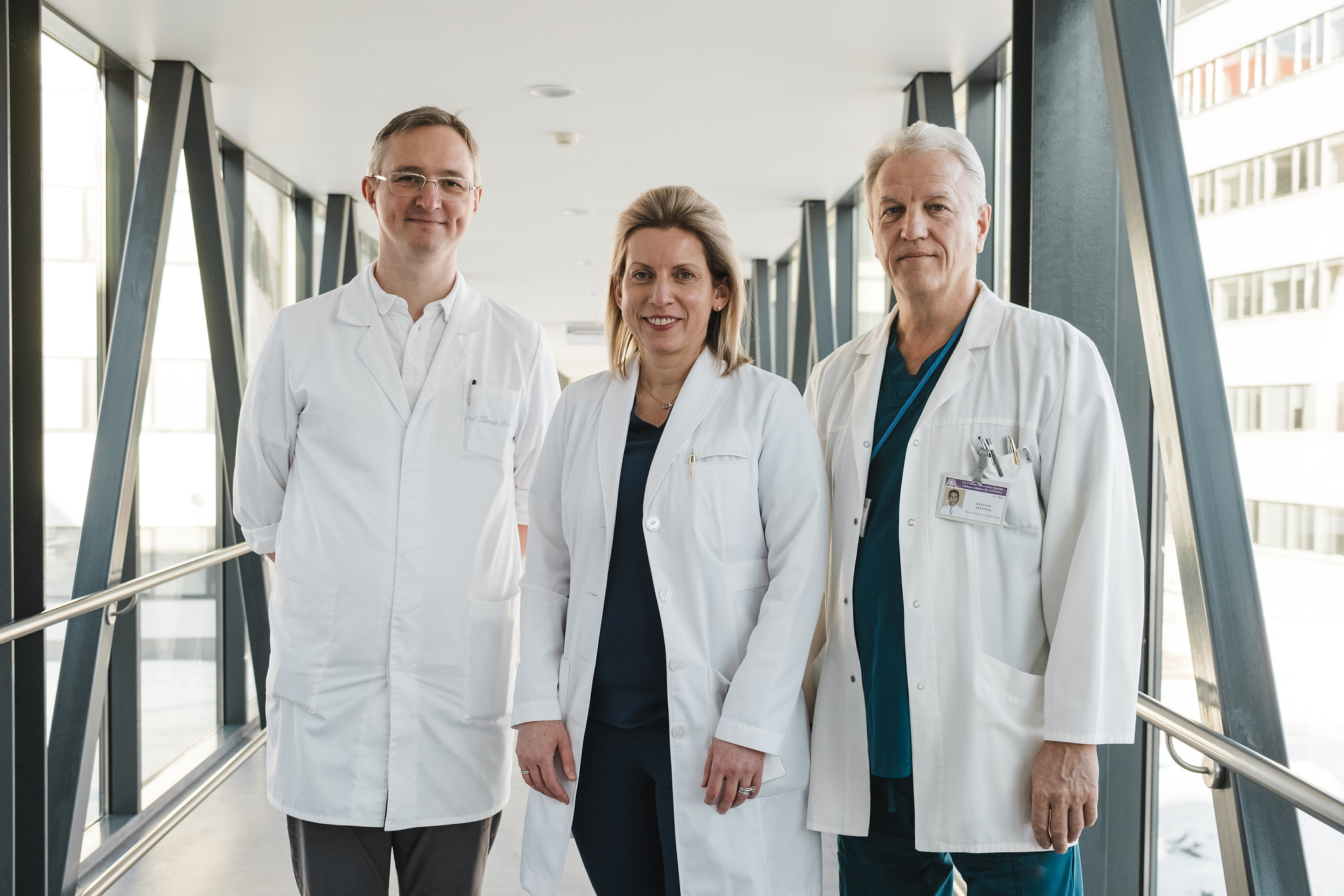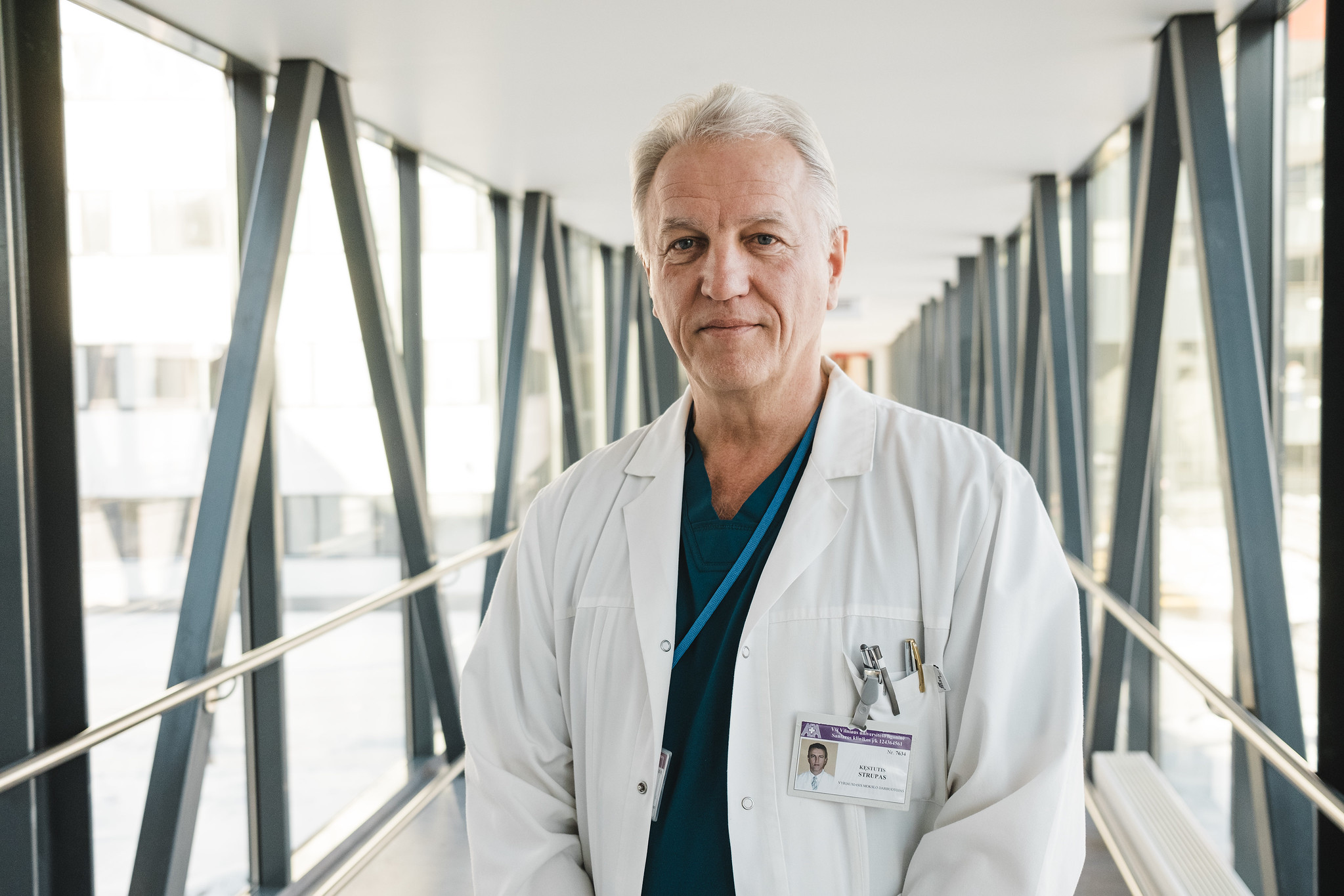Prof. Kęstutis Strupas: “I Can’t Imagine Being a Practising Surgeon without Some Exposure to Science”

From left to right: Prof. Tomas Poškus, Dr. Aistė Kielaitė-Gulla, Prof. Kęstutis Strupas
This year, three groups of scientists from the Faculty of Medicine at Vilnius University (VU) have been nominated for the Lithuanian Science Award. The series of papers entitled, From Surgery to Genome, Transcriptome, Metabolome: Fundamental and Applied Research and Innovation (2008–2022) was submitted for the award by Prof. Kęstutis Strupas (Head of the Gastroenterology, Nephro-Urology and Surgery Clinic at VU Faculty of Medicine), Prof. Tomas Poškus (Director of the Institute of Clinical Medicine and Head of the Abdominal and Onco-Surgery Centre at VU Hospital Santaros Klinikos), and Dr. Aistė Kielaitė-Gulla (Head of the Centre for Visceral Medicine and Translational Research and Head of the Organ Transplantation Coordination Centre of Santaros Klinikos). Prof. K. Strupas agreed to tell us about the papers that were submitted for the award.
Transplantation in Lithuania
According to Prof. K. Strupas, the very title of the collection of projects shows that science in medicine is changing very rapidly. “If in the past a surgeon used to prepare scientific presentations based on their clinical practice, i.e. by comparing various experiences, and so on, today, relying on clinical studies alone is not sufficient. The scientific ranking by quartile of such papers is now no longer Q1 or Q2, but rather Q4,” the academic said. The professor explained how the 2009 Congress of the German Society of Surgery provided him with the impetus towards fundamental science: “I have been a member of this society since 1990. Every year, I attend its congress. I was surprised by the prizes awarded at the 2009 congress to two German surgeons working at the Karolinska Institute in Stockholm. One of them was awarded a prize for genetic research in surgery, and the other for the discovery of the metabolome present in one of the surgical processes in acute, inflammatory pancreatitis. When I came back from the congress, I made a presentation and told my colleagues that the world was changing. Our clinical studies were interesting, but we needed to go deeper into genomics, proteomics, metabolomics, DNA, RNA, and other areas of fundamental medicine.”
The first paper in the series – Minimally Invasive Surgery and Transplantology – is related to the achievements of the Gastroenterology, Nephro-Urology and Surgery Clinic at VU Faculty of Medicine. “Among the Baltic countries, Lithuania leads the way in transplantology. We have performed 150 liver transplants, 20 complex pancreas and kidney transplants, and many artificial liver perfusions and pancreatic cell transplants. All of this is the result of the efforts of physicians working in just one speciality at our clinic. I remember we had already performed 50 liver transplants, and in 2014, with the encouragement of the former Dean of the Faculty of Medicine, Zita Aušrele Kučinskienė, I wrote a monograph on Liver Transplantation for the Lithuanian Science Award,” Prof. Strupas said. However, the award went to another scientist for their paper on genetics. “My colleagues and I became interested in this field and started implementing it. My own work branched out into several areas united under one concept, that abdominal surgery is a complex field, and the thinking in my generation was that if you are an abdominal surgeon, you can operate on anything,” said the professor. The professor further explained that today, things are different, and surgery is divided into specialist fields: transplantology, coloproctology, hepatopancreatic surgery, gastrointestinal surgery, endocrine and metabolic surgery, etc. “These are all independent fields. Therefore, the second part of the series of papers is by Prof. T. Poškus and focuses on coloproctology. It is dedicated to educating young people and showing that abdominal surgery actually consists of specialist fields,” added the professor.
Coloproctology, visceral medicine and international cooperation
In 2009, Prof. K. Strupas, together with Prof. Poškus, implemented a Colorectal Cancer Screening Programme in Lithuania. “The [Health] Ministry set up a group that I led. The programme has been successful and is ongoing. In terms of results and reliability, it is one of the best-rated programmes not only in Lithuania but also across Eastern Europe. Prof. T. Poškus is the Vice President of the European Society of Coloproctology and a member of the Council of the European Surgical Association. In my opinion, he is one of the best coloproctology surgeons in the Baltic countries. The clinical practice studies he conducted were integrated into the general European coloproctology studies,” the professor explained regarding his colleague’s contribution to the award-winning series of scientific papers. The third part of the series aims to show that surgery without a scientific focus is not viable today. “This is how Dr. A. Kielaitė-Gulla came to join the research in 2015/2016. Her educational background includes studies at both Harvard and Stanford. She spent a lot of time in the US, and her most recent fellowship was at the Memorial Sloan Kettering Cancer Center, currently the global “mecca” for cancer, oncology and fundamental research. In 2019, the Centre for Visceral Medicine and Translational Research was opened at VU Faculty of Medicine to develop translational research, or in other words, “from the research lab to the operating room/bedside.” The centre is structured according to the research groups mentioned above, and its staff are young researchers. Dr. A. Kielaitė-Gulla is currently the head of the centre,” Prof. K. Strupas noted.
The whole series of papers consists of clinical, fundamental and translational research, detailing the biological mechanisms of gastrointestinal diseases and the pathogenesis of diseases, providing insights into them at the single-cell level, and translating the results of all the scientific discoveries into surgical practice. The research has been conducted in conjunction with some of the best universities in Europe, including Heidelberg and Hamburg (Germany), Leuven (Belgium), Lund (Sweden), Padova (Italy), Oslo (Norway), and the VU Life Sciences Centre (Lithuania). “In 2002, when I became the Head of the Centre for Abdominal Surgery at Santaros Klinikos, my colleague Prof. Markus Büchler became the Head of the Centre for Surgery at the University of Heidelberg. Prof. Büchler is a world-renowned pancreatic and hepatopancreatic surgeon. Every year, several young surgeons from our centre travel to the University of Heidelberg for training and research. Subsequently, we also started to cooperate with scientists from the University of Graz in Austria, where there is a research centre like the one we have at VU Faculty of Medicine. We send one of our more promising students and residents to the University of Graz every year to train as surgeons, learn fundamental medical sciences, and defend their theses at our Abdominal Surgery Centre in Santaros Klinikos. Our latest project with the University of Graz, funded by the European Structural Funds, focuses on the discovery of a “liver on chip” that will help deliver drugs precisely to the core of disease at a molecular level. When drugs are injected intravenously, they spread throughout the body, but there is a technique where you can make the drug go where it needs to go, i.e. where the pain is,” explained the professor concerning their collaboration with foreign universities. The professor also noted that, with the help of Dr. A. Kielaitė-Gulla, a connection has been established with the US: “In 2020, when the coronavirus started spreading, Dr. A. Kielaitė-Gulla proposed setting up the International HPB Surgery Journal Club. The idea is, that on one Friday of each month, the global HPB centres come together to discuss research, articles, etc. The discussions are very interesting, helping to broaden the breadth of our networks and our clinical experience. This is particularly useful for young doctors and scientists,” said the scholar.

Prof. Kęstutis Strupas
The importance of fundamental science
According to Prof. K. Strupas, this series of papers is not just science for science’s sake, but it is the science that demonstrates how issues and problems that arise in clinical practice become the objects of scientific research. “Our aim is not just to have publications in high-ranking journals but to put the work into practice,” he explained. However, he acknowledged that being a good practitioner and a good scientist at the same time can be a costly professional “symbiosis”. “When you are a practitioner, an educator and a scientist, doing research, writing papers, and other academic activities takes longer and creates challenges, and requires collaboration between scientists and practitioners. Today, we certainly have achieved it,” said the professor. According to the academic, medical students and those who wish to become physicians should be aware that being only a practitioner, i.e. not reading anything or not being interested in medicine as a science, makes their acquired knowledge “obsolete” within 3–4 years. “I can’t imagine being a practicing surgeon without some exposure to science. This could be just reading. But when you write and collect your own material, you accumulate experience, you understand better what is going on and what you are doing. Surgery, in short, is about making the right incision, removal, and stitching, but scientific knowledge is required to execute it correctly,” he added.
In transplantation, the average surgery takes between 6 and 9 hours. “One should not forget the whole pre-operative process: when the news about the donor comes, and you have to go to the hospital to collect the organ, to bring it and prepare it for the surgery, remove the recipient’s organ, and place the new organ in their body. In total, there are six steps. Two of us used to perform all these steps, but today, there are six of us, so we share the tasks. In surgical oncology, the duration of surgeries is 4–6 hours, in other words, one surgery per day. That’s why my team and I have chosen such a wide range of areas, from surgery to fundamental and clinical research – genomics, transcriptomics and metabolomics,” explained the surgeon. “Clinical trials assess all treatment outcomes at different levels – early postoperative outcomes, further outcomes and outcomes after five years. It is also important to prepare the patient for surgery well; then, the post-operative results are much better. For example, my former PhD student, a very talented young scientist, Dr. Augustinas Baušis, did his thesis on the pre-rehabilitation of gastric cancer patients, i.e. their pre-operative treatment. A huge team was involved in such research: rehabilitation therapists, physiotherapists, pulmonologists, cardiologists, etc.,” concluded Prof. K. Strupas.